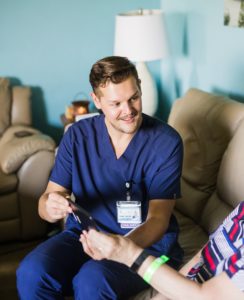“When you treat someone good, it makes their whole experience.”
 When faced with a serious illness, unexpected complications can often land patients in the hospital at the same time they are already trying to manage other healthcare stressors. Afifa experienced this firsthand when side effects from her chemotherapy treatment for breast cancer brought her to the emergency room at Marshfield Medical Center in early September.
When faced with a serious illness, unexpected complications can often land patients in the hospital at the same time they are already trying to manage other healthcare stressors. Afifa experienced this firsthand when side effects from her chemotherapy treatment for breast cancer brought her to the emergency room at Marshfield Medical Center in early September.
“I had major symptoms—diarrhea, nausea, dehydration, and extreme fatigue,” Afifa recalls. “My magnesium and potassium levels were low as well, so they had to admit me to the hospital.”
But Afifa was resistant to the idea of staying in the hospital. She says that her routine chemotherapy already made her feel irritable and fatigued and thinking about a hospital stay sounded overwhelming. “I didn’t like the idea of going to the hospital and staying in the bed,” she shared. “Because I knew that I would be needing care for a longer period of time. I couldn’t stay in the hospital for that long, and actually I didn’t want to.”
Care in the comfort of home
So, when Afifa was offered admission to the Marshfield Clinic Home Recovery Care program, she was happy to accept the chance to return home for her hospital care. As part of her treatment plan at home, she was given remote patient monitoring devices and a tablet for virtual physician visits. Her care included twice daily nursing visits, skilled management of her central intravenous (IV) line, and IV therapy including nausea medication, potassium and magnesium replacement, and hydration.
“It worked pretty well for me. The first few days after I was discharged from the hospital we had the video call with the doctor,” Afifa recalled. Then, with a plan in place, she continued to follow up periodically with the doctor with ongoing support from her team of nurses. That support included coordinating routine lab draws from her central line with her primary oncologist, who was four hours away— helping her avoid extra trips back and forth to manage her cancer care.
She shared, “The idea that whenever I need someone, from the comfort of my home I just call, and someone will be here to help me- that made things stress-free for me.” And that stress relief extended to her husband, too: Afifa says they were both worried about the amount of time he might have to take off work to come to the hospital. “It was a big sense of relief, just not worrying that if something happened, I’d have to go the hospital and my husband would have to stay there and everything.”
A path to feeling better mentally and physically
Afifa says that she thinks being at home in a familiar environment helps people to feel better both mentally and physically. “You get stressed from everything when you’re in the hospital. But when you’re at your home, you don’t feel that sick. You get your infusion, and then you’re doing other stuff– you’re sitting with your family, you’re watching TV.”
Because she frequently experienced intense side effects from her chemotherapy, Afifa ultimately ended up enrolling in the Marshfield Clinic Home Recovery Care program three times for hospital-level support at home. She credits the program with helping to keep her spirits up when she might have otherwise felt down. “I think it was a really major part of the support that helped me go through the five or six months of chemo, so it was a really great thing.”
Afifa remembers the Home Recovery Care team as an especially bright spot for her. “I was really moved– you have Dr. Guidibanda with you in the program– and she was always so helpful. One time it was late at night in the hospital, and I needed to be admitted– she just came for me from her home,” she shared.
“I really felt like ‘people do care about you,’ and that kind of feeling makes you feel really good. And all the nurses that came to my home, they were so friendly and so caring– I just want to say thank you to them, for making this whole experience easy for me to go through. It’s a great thing to do for someone. When you treat someone good, it makes their whole day and their whole experience.”
